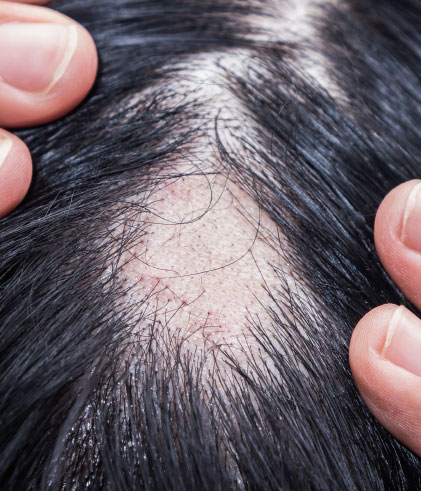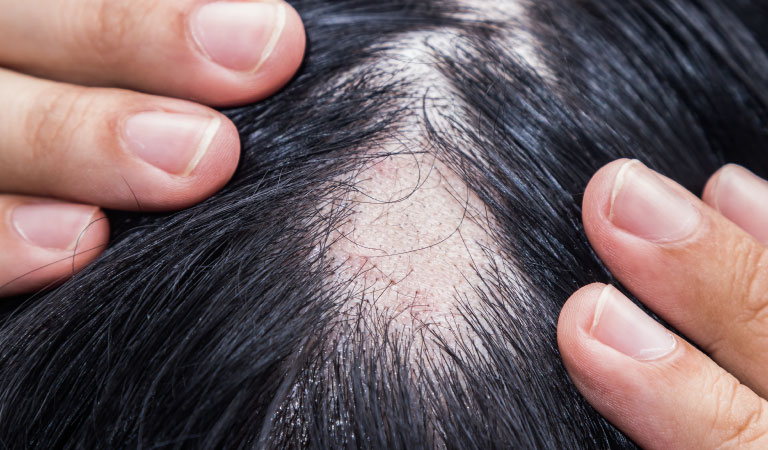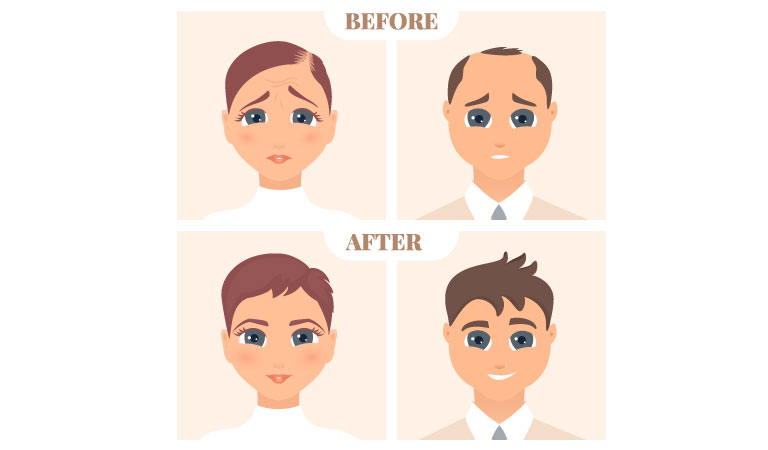

Possible Alopecia Areata Triggers That Affect Men & Women
While male and female pattern baldness is the main reason of hair loss in many cases, when it comes to hair fall there are various potential triggers. This means it can be complicated to pinpoint the exact reason why your hair strands are falling out. In this article, first let’s understand the possible triggers of hair loss in men and women.
Also read: https://www.drbatras.ae/hair-loss/alopecia-treatment
- Alopecia areata: It is an autoimmune disease that causes sudden hair loss. There can be sudden hair fall from the scalp, eyebrows or eyelashes in spots or patches.
- Androgenetic alopecia: This is a very common cause of hair loss in both men and women. It is also known as male or female pattern baldness. Androgenetic alopecia is likely to happen as you age, if it’s in your genes, but it can start at any point after puberty. According to the American Academy of Dermatology (AAD), many women who experience androgenetic alopecia develop it due to early menopause. A hormonal imbalance can lead to various health conditions, from acne to obesity. Estrogens or Oestrogens (female hormones) help to keep the hair growth phase for an optimal span of time. Androgens (male hormones) are not ‘hair friendly’, and can curtail the hair growth cycle. An excess of androgens (which could be caused by an endocrine disorder, such as polycystic ovarian syndrome) can cause severe hair loss.
- Anagen effluvium: It causes severe hair fall during the anagen (growth) phase of the hair growth cycle. This condition may cause hair fall from the head, or from other parts of the body, including eyebrows and eyelashes. Causes of hair loss include:
- Chemotherapy
- Radiation
- Skin infections
- Autoimmune disease
- Telogen effluvium: It is a condition where the hair stays in the telogen (natural shedding) phase of the hair growth cycle. Some possible causes of hair loss include:
- Severe stress
- Surgery
- Childbirth
- Rapid weight loss
- Thyroid problems
- Certain conventional medications.
- Traction alopecia: It refers to the hair loss due to tight hairstyles, which causes hair breakage. If traction alopecia continues, an individual may develop bald spots and hair thinning. Hairstyles related with this condition include:
- Tight buns, ponytails or braids
- Cornrows (a hairstyle where hair is braided very close to the scalp)
- Hair extensions.
- Hypothyroidism and hyperthyroidism: The thyroid hormones play an important role in the development and maintenance of the hair follicles. The thyroid imbalance causes an ill-effect on your hair follicles. Furthermore, if hypothyroidism is left untreated it may result in anaemia.
- Nutritional deficiencies: Extreme diets that are low in protein and certain vitamins and minerals, such as iron, can sometimes cause severe hair loss. One of the most common causes of hair loss in women is iron deficiency (anemia). Iron is essential for the production of hair cell protein. Additionally, deficiency of vitamin B12 often causes hair loss as it can affect the health of red blood cells, which carry oxygen to your tissues. It is most common in vegetarians as vitamin B12 is mainly obtained through animal proteins.
- Childbirth: Some women may experience excessive hair loss shortly after giving birth, due to a decrease in oestrogen levels. This type of hair loss is generally a temporary hair problem.
- Stress: It is not a myth that severe stress can cause severe hair loss. It can actually raise androgen (male hormone) levels, which in turn can cause hair loss. Stress and depression can also trigger hair problems such as dandruff or scalp psoriasis, disrupt your eating habits and can also alter your immune system.
If you experience excessive hair loss, please consult a trichologist or a hair specialist. There could be some underlying hair loss causes that need to be addressed immediately.
Alopecia Areata Causes
One of the triggers of hair loss in individuals is Alopecia Areata (AA) or patchy hair loss. It is a common autoimmune disorder that often results in unpredictable hair loss in patches. In alopecia areata, the immune system mistakenly attacks the hair follicles and disrupts normal hair formation. According to the National Alopecia Areata Foundation of California, this hair disease can affect anyone regardless of age and gender, though most cases occur before the age of 30. Furthermore, alopecia areata occurs within family members, suggesting a role of genes and is also known as ‘polygenic disease’. There can be many triggers that contribute to developing this complex condition, including inside the body (from a virus or bacteria), outside the body (environmental factors) or a combination of both. Alopecia areata can be associated with other autoimmune conditions such as:
- Thyroid disease
- Vitiligo
- Rheumatoid arthritis
- Ulcerative colitis (inflammatory bowel disease).
Read about the hair loss treatment at Dr Batra’s™: https://www.drbatras.ae/hair-treatment-at-dr-batras
https://www.drbatras.ae/did-you-just-spot-bald-spot-your-beard-it-might-be-alopecia - Also Read
https://www.drbatras.ae/hair-loss/alopecia-treatment - Also Read
https://www.drbatras.ae/what-causes-alopecia-areata-in-men - Also Read
https://www.drbatras.ae/5-ways-to-prevent-traction-alopecia - Also Read

Alopecia Areata Treatment
According to a research study published in the Tantia University Journal of Homeopathy and Medical Science, alopecia areata is a hair disease that needs to be treated through internal immune-correction, which is possible with homeopathy. Homeopathic medicines trigger the body’s immune system to fight back the hair disease effectively in an individual.
Dr Batra’s™ combines homeopathy and aesthetics to provide the best treatment for hair loss in men and women. The aesthetic treatments help to enhance the volume and density of your existing hair.
We suggest that you take the Dr Batra’s™ hair loss evaluation test in order to assess the current condition of your hair problems. A homeopathic doctor will customise your hair treatment after considering specific conditions that affect hair regrowth. Book an appointment with Dr Batra’s™ https://www.drbatras.ae/book-an-appointment and let our expert combination of homeopathy and technology provide the most appropriate hair growth treatment for you.
Key Takeaways
- Hair loss can be caused by various factors, including alopecia areata, androgenetic alopecia, and traction alopecia.
- Conditions like anagen effluvium and telogen effluvium can lead to significant hair shedding due to issues like stress, illness, or medical treatments.
- Thyroid imbalances and nutritional deficiencies, such as low iron or vitamin B12, can also contribute to hair loss.
- Childbirth and severe stress can temporarily increase hair loss due to hormonal changes and lifestyle impacts.
- If experiencing excessive hair loss, consulting a specialist is important to address potential underlying causes.

